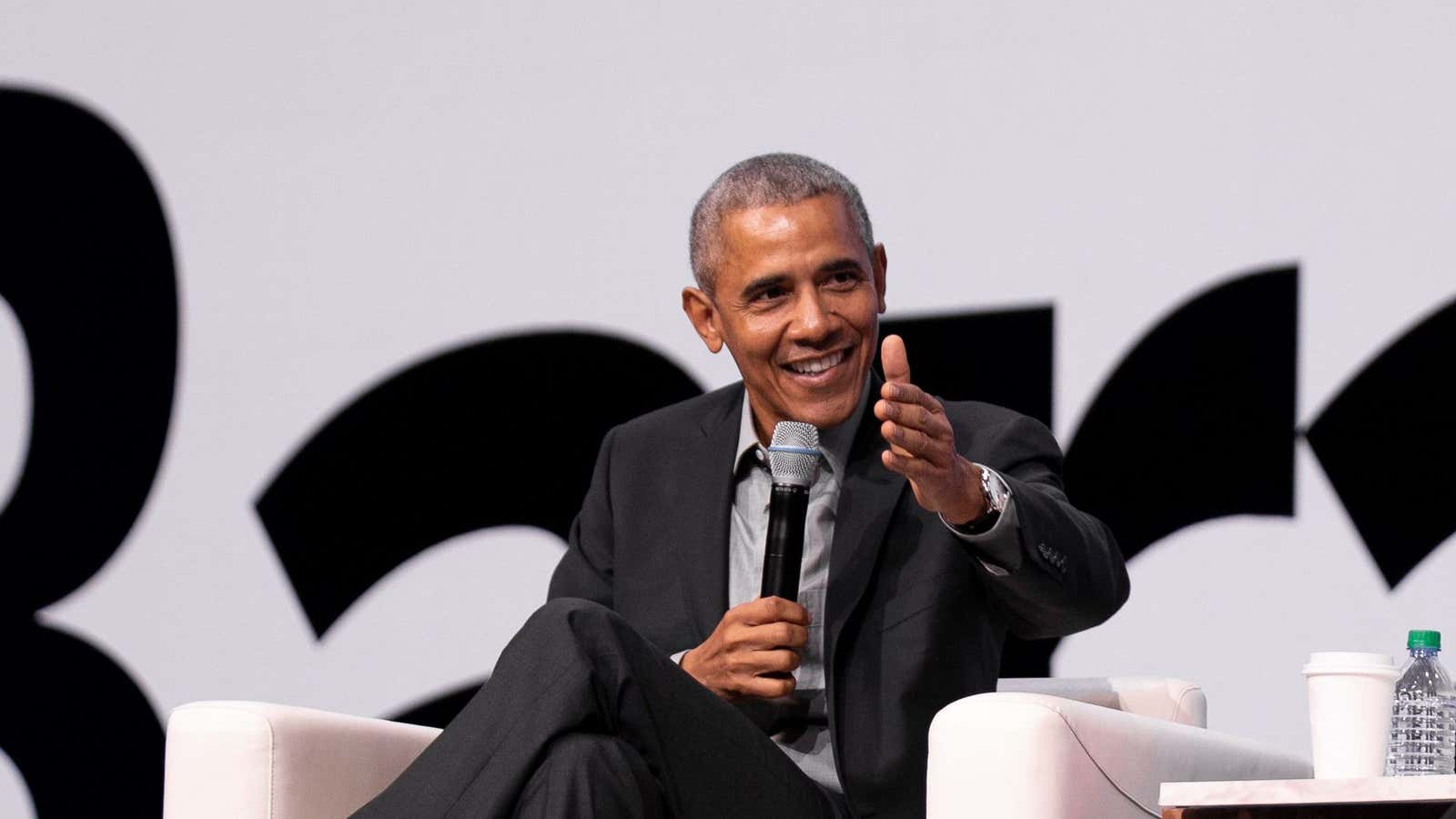When he left the White House two years ago, Barack Obama found that life in the civilian world moved slowly, “a little bit like The Matrix, where at the end, Neo slowed down the bullets,” he said in Salt Lake City on March 6 at the 2019 Qualtrics X4 Experience Management Summit.
Obama had become accustomed to dealing with situations quickly, because they were often literally life or death, he told Qualtrics CEO Ryan Smith, in an on-stage interview before 11,000 mostly private-sector tech employees. “People’s idea of government is like the DMV, or the post office, when you used to go to the post office,” the former US president said, “but that’s not how the West Wing operates.”
Smith had to ask: When he entered office after his 2008 election, how did he begin making weighty decisions about issues he would not have encountered before? Where did he even start?
Obama, not surprisingly, given his professorial disposition, described a framework for working through such circumstances—not only to make a tough call, but to have confidence in it.
Become comfortable with probabilities
When problems reached him in the White House, he said, it was because they were unsolvable. He generally was being asked to choose between two bad options. “By definition, if it was an easily solvable problem, or even a modestly difficult but solvable problem, it would not reach me, because, by definition, somebody else would have solved it,” he said. “So the only decisions that came were the ones that were horrible and that didn’t have a good solution. They said, ‘Let’s send this to Obama, I don’t know what to do.'” That way, he joked, “when things got all screwed up,” people could blame him.
Moving forward, and fairly quickly, with impossible decisions about wars or a global financial crisis required, he said, “being comfortable with the fact that you’re not going to get [a] 100% solution, and understanding that you’re dealing with probabilities, so that you don’t get paralyzed trying to think that you’re going to actually solve this perfectly.”
The question should be: What’s the best option you have?
Get the facts, recruit the best minds
Next, the former president said, he would begin gathering as much information as possible from intelligent sources. “I’m old fashioned. I believe in these enlightenment values like facts and reason and logic,” he said, making a winking reference to the current administration and its shaky relationship to science or truth.
“If I had set up a good process in which I could get all the information, all the data, all perspectives, if I knew that I had around the table all the angles…then I could feel confident that even if I didn’t get a perfect answer, that I was making the best decision that anybody in my situation could make,” Obama explained. “That was true whether it was the Bin Laden raid, which was a essentially a 50/50 call. And that was true whether it was what to do about the banking crisis—again, sort of a 55/45 call.”
“Probably the last piece of this that was most critical was having the confidence to have people around you who were smarter than you, or disagreed with you, or have perspectives that were different than yours,” he said. This helped keep him from wasting time thinking he had reached solutions when he hadn’t.
Also key, he said, was feeling certain you would understand what those experts were saying. To that end, he wouldn’t stop asking questions until the facts were clear to him. “I am pretty proud of this: I always would say to somebody, if they’re talking about a really complicated issue, ‘I don’t understand what you’re saying. Explain it to me in English.’”
“I think one of the problems with people who are in big jobs is they start feeling as if they have to project that ‘I have every answer,'” he said, “when, in fact, most of the time, you may not.”
Little hat, big decision
Obama illustrated the value of not being intimidated by people who are geniuses in their fields with a story about the Deep Water Horizon oil-spill disaster of 2010, when an explosion at a BP oil rig left a hole in a well, 5,000 feet beneath the ocean surface. “BP didn’t know how to shut down this hole in the bottom of the ocean, Obama said. “Halliburton, which had built the rig, didn’t know how to do it.” So he put his energy secretary, the Nobel prize-winning physicist Steven Chu, to work on the problem.
About three weeks into the crisis, Chu approached the president. “[A]nd he’s got like a napkin or something,” Obama recalled, “and he says, ‘You know, I think this thing might work.’”
Chu showed Obama a drawing of what looked “a little hat,” Obama said, with some numbers scribbled next to it. “We sent it to BP and they basically made better specs, and designed it, and capped [the hole], and it worked,” he continued.
“My role as a leader in that organization was not to come up with a little hat, because I wouldn’t have thought of that,” he said, with his trademark self-deprecating humor. “I would have thought, ‘That doesn’t look complicated enough. And I don’t know like how big should the hat should be.’”
“But my job was to ask Steven Chu there, who had a Nobel prize in physics,” he explained. “That gave me a lot of confidence.”
